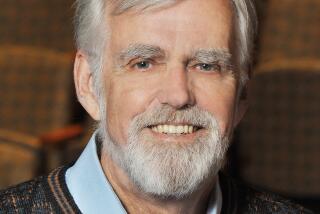STAGE REVIEW : SCR’s ‘Crucible’: Gripping, Chilling
- Share via
The longer I worked, the more certain I felt that as improbable as it might seem, there were moments when an individual conscience was all that could keep a world from falling.
--Arthur Miller, “Timebends.”
Almost as gripping as the play itself is Arthur Miller’s account, in his incisive memoir “Timebends,” of how and why he set about writing “The Crucible.” And every bit as gripping as it ought--yet rarely manages--to be, is Martin Benson’s production of this play at South Coast Repertory.
It isn’t enough to envision “The Crucible” in the afterglare of McCarthyism (anyone who needs to be reminded of that societal disaster may catch up with it at the Odyssey Theatre Ensemble in a swirling piece by Jeff Goldsmith simply called “McCarthy”). Miller is too fine a playwright to indulge in political tract writing. “The Crucible” is profoundly a play, as he says in his book, about individual conscience. In that sense it is ageless and passionate, its timeliness perennially renewed by resurrections of zealotry--or the threat of them.
It seems people need periodic reminding of how zealots can, indeed, lay the Earth to waste and how (as the notorious closing line of Bertolt Brecht’s “Resistible Rise of Arturo Ui” graphically slams home) the spawners of such demonic dogs come seasonally into heat. The persecutions of the senator from Wisconsin may have moved Miller to write “The Crucible,” but they were only the goad. He ended up writing something far more scathing, searching and universal than a mere account of the Salem witch-hunt trials of 1692. He wrote a magnificent play that explores the cyclical groundswells and tidal waves behind such occurrences, a play that scrutinizes evil’s recurring momentum and probes man’s need to resist it--usually at some awesome personal cost.
There is in the personal tragedy of this small village of Salem, Mass., a paradigm for the global village. When the denouncing of so-called witches becomes an unstoppable snowball, it assumes reverberations that chill the bone marrow. When the desperate John Proctor, not unlike Joan of Arc, has to choose between lying to live or dying for his truths, his pleading to preserve his good name slices through the air like a knife through the heart, “. . . because it is my name; because I cannot have another in my life. How can I live without my name? You have my soul. . . . Leave me my name. . . .”
It comes through as the linchpin of one of the most absorbing and suspenseful productions witnessed to date on South Coast’s Mainstage. Director Martin Benson has galvanized a company of South Coast stalwarts augmented by a sprinkling of returning faces and some very strong new ones. Among the most welcome returnees are the splendid Robert Cornthwaite as shrewd Giles Corey and the massive I. M. Hobson as the prize inquisitor, Danforth.
Most notable among the newcomers are James Sutorius as doomed John Proctor, Kandis Chappell as his stoic wife and Herta Ware as a nothing-saintly, refreshingly down-to-earth Rebecca Nurse. Rarely has this play been more lucidly conveyed. And its incarnation at South Coast never flagged for a moment, despite clocking in at three hours.
The physical presentation of this “Crucible” is equally remarkable. It begins with the clean lines of Susan Tuohy’s gray wood set designs, at once suggestive in its thin, vertical lines of puritanical rigor, architectural purity and a cleansing Quaker sensibility. The airy, pastel grays are caressed rather than lit by Tom Ruzika; he closes each scene in an orange glow that zeroes in on the central action without overstaying its welcome.
This visual lightness, which contrasts to surprisingly good effect with the play’s dense themes, is beautifully extended in the pale greens and grays and whites of Robert Blackman’s Puritan costumes. There is an exaltation to the whole, a certain potent luminosity. Only in Michael Roth’s mostly unobtrusive music and concealed sound is the underlying darkness of the subject matter revealed--particularly in a singular, leaden gurgle that opens and closes the play, sounding like a malevolent rumble regurgitated from hell.
Miller writes in “Timebends” that he can “almost tell what the political situation in a country is when the play is suddenly a hit there--it is either a warning of tyranny on the way or a reminder of tyranny just past.” It’s an amazing statement, as open to interpretation as we are free to variously perceive our political realities. Make of it what you will, but do not miss this production.
At 655 Town Center Drive in Costa Mesa, Tuesdays through Saturdays, 8 p.m.; Sundays, 7:30 p.m., with matinees Saturdays and Sundays, 2:30 p.m. Ends Oct. 13. Tickets: $15-$26; (714) 957-4033.
“THE CRUCIBLE”
Arthur Miller’s play presented by South Coast Repertory on its Mainstage. Director Martin Benson. Sets Susan Tuohy. Lights Tom Ruzika. Costumes Robert Blackman. Music and sound Michael Roth. Production manager Ted Carlsson. Stage manager Bonnie Lorenger. Cast Nicole Parker, Jarion Monroe, Fran Bennett, Katherine Hiler, Lisa Steele, Anni Long, Robert Machray, Martha J. New, Margaret Marx, James Sutorius, Herta Ware, Robert Cornthwaite, Richard Doyle, Kandis Chappell, Hal Landon Sr., Don Took, Art Koustik, Dennis Robertson, I.M. Hobson, Pat Shaw, Jim Donovan.
More to Read
The biggest entertainment stories
Get our big stories about Hollywood, film, television, music, arts, culture and more right in your inbox as soon as they publish.
You may occasionally receive promotional content from the Los Angeles Times.










